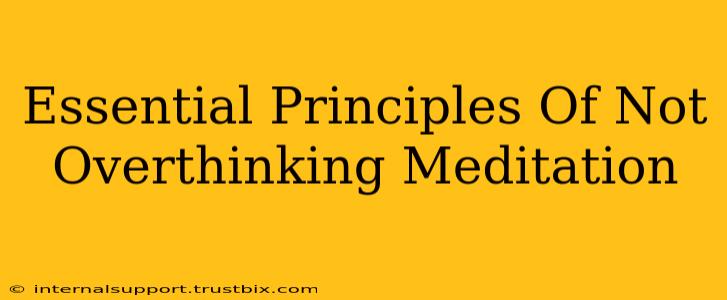Meditation, a practice lauded for its stress-reducing and mindfulness-enhancing benefits, can ironically become a source of stress when we overthink it. The paradox is that the simpler we approach meditation, the more effective it becomes. This post explores essential principles to help you navigate the mental chatter and embrace the calm of a truly effective meditation practice.
Let Go of the Idealized Meditation
Many beginners approach meditation with a preconceived notion of what it "should" be: complete stillness, an absence of all thoughts, a blissful state of nothingness. This idealized image often sets us up for failure. The truth is, the mind wanders. Thoughts, sensations, and emotions will arise—that's perfectly normal! Instead of fighting these thoughts, accept them as fleeting clouds passing across the sky of your awareness.
Embrace Imperfection: Your Unique Meditation Journey
Each meditation session is unique. Some days you'll experience profound stillness; others, your mind might feel like a whirlwind. Don't judge your practice based on these fluctuations. Consistency, not perfection, is the key to reaping the benefits of meditation. Remember, every session, regardless of its perceived "success," contributes to your overall well-being and mental clarity.
Focus on the Present Moment: The Power of Now
Overthinking often stems from dwelling on the past or worrying about the future. Meditation is a powerful tool to anchor you in the present moment. Focus on your breath, your body sensations, or a chosen mantra. When your mind wanders (and it will!), gently guide your attention back to your chosen anchor. This act of redirection is the very essence of the practice.
Cultivate Gentle Awareness: Not Strict Control
Don't try to forcefully control your thoughts. Instead, cultivate a gentle awareness of them. Observe them as they arise and pass, without judgment or attachment. Imagine them as leaves floating down a stream—simply watch them flow by. This non-judgmental observation is crucial for preventing overthinking and fostering inner peace.
Start Small & Be Consistent: Building Your Meditation Muscle
Begin with short meditation sessions, even just 5-10 minutes a day. Consistency is far more important than duration. Regular, even brief, practice is more effective than infrequent, lengthy sessions. Gradually increase the duration as you feel comfortable. This approach builds your "meditation muscle," making it easier to quiet the mind over time.
Find Your Ideal Meditation Environment: Comfort is Key
Create a peaceful and comfortable space for your meditation practice. This could be a quiet corner in your home, outdoors in nature, or even a comfortable chair. Minimize distractions such as noise and visual clutter. The more comfortable and relaxed you are, the easier it will be to focus and reduce overthinking.
Seek Guidance When Needed: Explore Different Techniques
If you find yourself struggling with overthinking, consider exploring different meditation techniques. Guided meditations, mindfulness exercises, or even body scan meditations can provide structure and support. Don't hesitate to seek guidance from experienced meditation teachers or practitioners. They can offer valuable insights and personalized advice.
Patience and Persistence: The Rewards of Consistent Practice
Meditation is a journey, not a destination. There will be days when it feels effortless, and days when it feels challenging. Be patient with yourself, and persistent in your practice. The rewards of reduced stress, increased focus, and enhanced self-awareness are well worth the effort. Remember, the goal isn't to eliminate thoughts entirely, but to cultivate a greater awareness of your inner landscape and learn to navigate your thoughts with greater ease.

